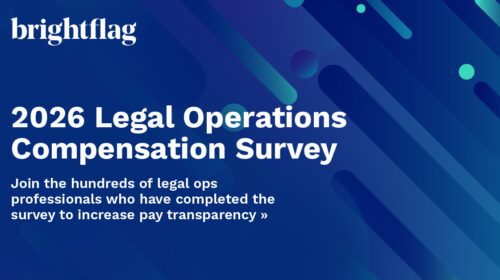The Ultimate Guide to Legal Operations Job Descriptions
Back in the 1990s, only large, well-resourced organizations could afford to have a legal professional focused solely on finding efficiencies within the legal department. Now, due to the data-driven nature of most organizations, legal ops is becoming mandatory for managing legal work and spend.
However, what an organization needs from legal operations will vary based on the size and maturity of the company, which can make it difficult to write a legal operations job description.
That said, by using Brightflag’s research into legal operations job descriptions, best practices from mature legal ops teams, and resources produced by organizations such as CLOC, you can identify the skills and roles necessary to establish or grow your team.
Here are three tips for understanding the roles you need and defining legal operations job descriptions.
1. Clarify the Scope of Your Legal Ops Role
The scope and size of the legal ops function will grow as your department matures. Start with a narrow view of the function based on what your organization needs, but keep an eye on the future and how you expect to scale over the next 18 to 24 months.
The CLOC 12 Core Competencies framework will help you understand the scope of a legal ops hire and the roles and skills needed as your department matures.
Using this framework, consider how many legal ops professionals you need to cover the necessary responsibilities based on your level of maturity. Then, you can determine the seniority of the role(s) you need to fill.
Common Legal Ops Roles
Below, we list common legal ops positions, from most senior to entry-level:
- VP of Legal Operations: This senior role develops and executes strategy and key performance metrics for the legal ops team, including managing internal resources and improving relationships with external counsel. The VP leads transformational projects for the legal department.
- Director of Legal Operations: The director is responsible for day-to-day management of the legal ops team (where there is more than one legal ops team member). This person builds and implements the legal ops strategy and is responsible for reporting on the legal budget.
- Legal Operations Manager: The most common legal ops role, this position manages the department’s budget and technology. They provide advice on how the legal department can improve.
- Legal Operations Analyst: The analyst is responsible for understanding business intelligence data to make recommendations on how to optimize processes and improve efficiency.
- Legal Operations Specialist: This role makes sure the department’s legal technology runs smoothly and efficiently, such as e-billing and contract management.
- Legal Operations Associate: This entry-level position is responsible for data entry, document management, scheduling, and research related to legal ops projects. They typically work under the supervision of more senior legal ops roles.
Once you’ve defined the scope of your legal ops function, the role(s) you need, and the seniority of each role, formalize the skill sets in a job description for each role you are looking to hire.
2. Create a Legal Operations Job Description for Each Level
At Brightflag, we did the research to help you understand the legal ops skills and experience that organizations are hiring for so you can tailor your job description based on your needs.
With the help of AI, we reviewed dozens of legal ops job descriptions to see what organizations are looking for as they establish or expand their legal ops departments. Here are some of the most common skills found in legal ops job descriptions, from most to least mentioned. These skills are shared across roles, with the responsibility for strategy over execution increasing with seniority.
- Outside Counsel and Legal Professional Services Management: This was in the majority of the job postings. It includes budgeting, forecasting, and controlling expenses as part of your outside counsel’s legal services. Your hire should be able to develop and maintain relationships with outside counsel, ensure compliance with OC guidelines, and drive value from legal spend.
- Legal Ops Management and Process Improvement: This includes implementing and optimizing legal ops processes, such as contract and knowledge management and e-billing. The employee will drive operational efficiencies and process improvements while also developing, documenting, and enforcing internal controls to create consistency throughout the department. This was in 40% of job descriptions.
- Vendor and Technology Management: You want someone who can oversee vendor relationships, including negotiating terms and managing contracts. They should be able to implement and manage legal tech solutions, such as e-billing platforms, Contract Lifecycle Management (CLM) tools, and Document Management Systems (DMSs), to ensure they are used to their fullest capabilities. Look for a track record of collaborating with finance, IT, and other departments to ensure legal tech aligns with broader organizational objectives.
- Compliance and Risk Management: Your legal ops hire will need to support the development and implementation of compliance programs, policies, and procedures. They may also support regulatory filings, compliance audits, and internal investigations.
- Legal Financial Management: This role will manage the legal department’s budget, including planning, tracking, and analyzing legal expenses. Your ideal hire will need to work with finance to analyze legal spending patterns and identify opportunities for cost savings. They should also oversee the invoicing and payment process for legal services.
- Strategic Planning and Reporting: This skill includes helping develop strategic plans and goals for the legal department. The legal ops person will monitor legal department performance based on those goals and provide data-driven insights to legal leadership for decision-making.
- Knowledge Management and Training: Many job descriptions highlighted the need to develop and maintain a knowledge management system to make it easy to consistently share legal resources. You want someone who can create and deliver legal training programs for the legal team and broader organization, as well as maintain a repository of legal documents, templates, and best practices.
- DEI Initiatives: Not as common as other skills but still prevalent, many organizations hiring for legal ops want someone who will develop and implement diversity, equity, and inclusion goals for the legal team and external legal service providers. This includes leading initiatives to promote diversity within the legal department and among outside counsel, as well as analyzing progress and driving conversations around DEI in the legal field.
Level of Experience Required
Based on the skills needed and the scope of the role, decide the level of experience you want for junior, manager, director, and principal positions. Determine how that level of experience will impact the number of each role you need — or have budget for. During Brightflag’s review of dozens of open legal ops job postings, we found:
- Most junior positions required three years of experience, a JD was not expected, and base salary ranged from $67,000 to $91,000.
- Manager-level positions asked for six years of experience, a JD was not expected, and the base salary ranged from $116,000 to $184,000.
- For director and VP-level positions, the descriptions asked for eight years of experience, a JD was nice to have but not expected, and the salary ranged from $150,000 to $202,000.
From the sampling of legal operations job descriptions in our research, the average years of experience required increases with job level, and the more senior positions are more likely to require a JD. But before you include JD on your must-haves, make sure that designation will truly bring valuable skills to the role that can’t be gathered from experience or training.
Soft Skills For Your First Legal Ops Hire
By establishing a legal ops department, even if that’s just one person, you are committing to data-driven processes. In addition to the qualifications listed in the job descriptions,
LegalOps.com list the soft skills legal ops professionals should have. If you are hiring a more senior role, you’ll expect to see a higher level of each of these skills than for more junior roles.
- Strong communication skills: The person should communicate well, including writing, speaking, and listening. They should be able to understand detailed or complex processes and explain them to others.
- The ability to influence: A core tenet of legal ops is improvement. You want someone who can identify a problem, gather information on how to solve it, and encourage others to work differently. Your legal ops person must use both data and empathy to effect change.
- Self-knowledge: You want someone confident in who they are, their skills, and where they need to improve. A strong sense of values and ethics helps them make sound judgments and recognize their own biases.
- Effective collaboration skills: This person will work with a variety of people, both inside and outside of the organization. You want someone comfortable working with different levels and personalities to accomplish a goal.
- The ability to make connections: Your legal ops person will live in data so they can identify opportunities to improve. They need to think analytically and understand how different parts of the processes work together to identify what needs to change.
3. Build Capacity for Legal Ops
In addition to new positions, look for ways to improve the productivity of legal ops. Review assigned tasks to make sure all legal ops work is within scope. Anything that falls outside the scope of the CLOC Core 12 should be off limits, such as the day-to-day management of service of process and litigation holds. Those are better suited for a litigation paralegal than legal ops.
Legal ops should also lean on your vendors. The best legal tech vendors act as an extension of the legal department, providing suggestions on how you can improve and helping you get there. They should also highlight the most efficient ways to use the legal tech, including opportunities for automation, such as scheduling reports so they are delivered to your inbox as you need them.
Finally, nurture the legal department’s talent. Is there an ambitious paralegal on your team who you can train to be a legal ops analyst? Have them gradually take on more legal ops work as you transition their role.
Build a Department Focused on Modernization
The real value of legal ops comes from long-term investments in modernization and transformation. These long-term investments can only be led by staff members who understand your organization, are interested in the intersection of quality and efficiency, and are invested in the success of the department. Find and support talented legal ops team members who will help you create value for your department and your organization.
Wondering if your team’s compensation is in line with industry averages? Check out Brightflag’s annual compensation survey to help you set benchmarks and understand current trends.



